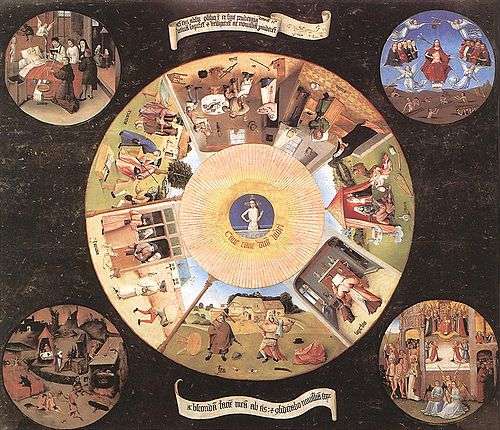Seven virtues
| Part of a series on |
| Catholic philosophy |
|---|
   Aquinas, Scotus, and Ockham |
| Ethics |
| Schools |
| Philosophers |
|
Renaissance |
|
Early Modern |
|
|
The Catechism of the Catholic Church defines virtue as "a habitual and firm disposition to do the good."[1] Traditionally, the seven Christian virtues or heavenly virtues combine the four classical cardinal virtues of prudence, justice, temperance and courage (or fortitude) with the three theological virtues of faith, hope and charity. These were adopted by the Church Fathers as the seven virtues.
Cardinal virtues
The Greek philosophers Aristotle and Plato, regarded temperance, wisdom, justice, and courage as the four most desirable character traits. The Book of Wisdom is one of the seven Sapiential Books included in the Septuagint. Wisdom 8:7 states that the fruits of Wisdom "...are virtues; For she teaches moderation and prudence, justice and fortitude, and nothing in life is more useful for men than these."
The moral virtues are attitudes, dispositions, and good habits that govern one's actions, passions, and conduct according to reason; and are acquired by human effort.[2] Immanuel Kant said, "Virtue is the moral strength of the will in obeying the dictates of duty".[3] The cardinal virtues are prudence, justice, fortitude, and temperance.
- Prudence from prudentia meaning "seeing ahead, sagacity") is the ability to govern and discipline oneself by the use of reason.[4] It is called the Auriga virtutum (the charioteer of the virtues) as it guides the other virtues.[5]
- Justice is the virtue which regulates man in his dealings with others. Connected to justice are the virtues of religion, piety, and gratitude. [6]
- Fortitude which Thomas Aquinas ranks third after prudence and justice and equates with brave endurance.[3] Patience and perseverance are virtues related to fortitude.
- Temperance is the virtue which moderates in accordance with reason the desires and pleasures of the sensuous appetite. Related to temperance are the virtues of continence, humility, and meekness.[6]
Philosophers recognized the interrelatedness of the virtues such that courage without prudence risks becoming mere foolhardiness. Aquinas found an interconnection of practical wisdom (prudentia) and moral virtue. This is frequently termed "the Unity of the Virtues."[7] Aquinas also argued that it not only matters what a person does but how the person does it. The person must aim at a good end and also make a right choice about the means to that end. The moral virtues direct the person to aim at a good end, but to ensure that the person make the right choices about the means to a good end, one needs practical wisdom.[8]
Theological virtues
The traditional understanding of the differences in the natures of Cardinal and Theological virtues, is that the latter are not fully accessible to humans in their natural state without assistance from God. "All virtues have as their final scope to dispose man to acts conducive to his true happiness. The happiness, however, of which man is capable is twofold, namely, natural, which is attainable by man's natural powers, and supernatural, which exceeds the capacity of unaided human nature. Since, therefore, merely natural principles of human action are inadequate to a supernatural end, it is necessary that man be endowed with supernatural powers to enable him to attain his final destiny. Now these supernatural principles are nothing else than the theological virtues."[6]
Seven virtues and the seven capital sins
A list of seven virtues that oppose the seven deadly sins appeared later in an epic poem titled Psychomachia, or Battle/Contest of the Soul. Written by Aurelius Clemens Prudentius, a Christian governor who died around 410 AD, it entails the battle between good virtues and evil vices. The enormous popularity of this work in the Middle Ages helped to spread the concept of holy virtue throughout Europe.
After Pope Gregory released his list of seven deadly sins in 590 AD, the seven virtues became identified as chastity, temperance, charity, diligence, patience, kindness, and humility. Practicing them is said to protect one against temptation from the seven deadly sins.
| Virtue | Latin | Gloss | Sin | Latin |
|---|---|---|---|---|
| Chastity | Castitas | Purity, abstinence | Lust | Luxuria |
| Temperance | Temperantia | Humanity, equanimity | Gluttony | Gula |
| Charity | Caritas | Will, benevolence, generosity, sacrifice | Greed | Avaritia |
| Diligence | Industria | Persistence, effortfulness, ethics | Sloth | Acedia |
| Patience | Patientia | Forgiveness, mercy | Wrath | Ira |
| Kindness | Humanitas | Satisfaction, compassion | Envy | Invidia |
| Humility | Humilitas | Bravery, modesty, reverence | Pride | Superbia |
It should be noted, however, that these seven virtues do not correspond to the seven heavenly virtues arrived at by combining the cardinal and theological virtues. Furthermore, efforts in the Middle Ages to set the seven heavenly virtues in direct opposition to the seven capital sins are both uncommon and beset with difficulties. “[T]reatises exclusively concentrating on both septenaries are actually quite rare.” and “examples of late medieval catalogues of virtues and vices which extend or upset the double heptad can be easily multiplied.” [9] And there are problems with this parallelism.
The opposition between the virtues and the vices to which these works allude despite the frequent inclusion of other schemes may seem unproblematic at first sight. The virtues and the vices seem to mirror each other as positive and negative moral attitudes, so that medieval authors, with their keen predilection for parallels and oppositions, could conveniently set them against each other. . . . Yet artistic representations such as Conrad’s trees are misleading in that they establish oppositions between the principal virtues and the capital vices which are based on mere juxtaposition. As to content, the two schemes do not match each other. The capital vices of lust and avarice, for instance, contrast with the remedial virtues of chastity and generosity, respectively, rather than with any theological or cardinal virtue; conversely, the virtues of hope and prudence are opposed to despair and foolishness rather than to any deadly sin. Medieval moral authors were well aware of the fact. Actually, the capital vices are more often contrasted with the remedial or contrary virtues in medieval moral literature than with the principal virtues, while the principal virtues are frequently accompanied by a set of mirroring vices rather than by the seven deadly sins.[10]
See also
References
- ↑ Catechism of the Catholic Church, §1803
- ↑ CCC §1804
- 1 2 Rickaby, John. "Fortitude." The Catholic Encyclopedia Vol. 6. New York: Robert Appleton Company, 1909. 6 April 2017
- ↑ Prudence – Definition and More from the Free Merriam-Webster Dictionary. Merriam-webster.com (2012-08-31).
- ↑ CCC §1806
- 1 2 3 Waldron, Martin Augustine. "Virtue." The Catholic Encyclopedia Vol. 15. New York: Robert Appleton Company, 1912. 6 April 2017
- ↑ Annas, Julia. The Morality of Happiness (Oxford; Oxford University Press, 1993), pp. 73–84
- ↑ Aquinas. Commentary on the Nicomachean Ethics, Book VI, Lecture XI, ##1279–1280
- ↑ Bejczy, István P. (2011). The Cardinal Virtues in the Middle Ages: A Study in Moral Thought from the Fourth to the Fourteenth Century. Boston: Brill. pp. 228, 229.
- ↑ Bejczy, 2011, pp. 232-33
![]()
| Wikimedia Commons has media related to The Seven Virtues. |

